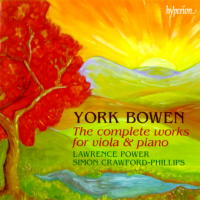
Virtuoso Credentials
Music for viola and piano
by York Bowen -
reviewed by
ROBERT ANDERSON'... above praise.'
|

|
York Bowen was one of the pianists in the first British performance of Mozart's concerto for three pianos, an early twentieth-century event; and Saint-Saëns considered him the greatest of modern British composers. Times change, but Bowen may yet take his rightful place as a first-rate writer for the piano, who yet also wrote idiomatically for a wide range of orchestral instruments. Royal College students followed Parry and Stanford in producing a mass of choral music. Their Royal Academy counterparts preferred instruments.
A special luminary of the Royal Academy in Bowen's time was Lionel Tertis. If the viola had spent much of its life as Cinderella, Tertis was determined it should go to the ball. He himself arranged Elgar's cello concerto for viola and won the composer's approval. The result of his campaign was music as disparate as Percy Grainger's Humlet for solo middle-fiddle and the Walton viola concerto. And Bowen's contribution in these ten original works plus an improvement on Beethoven is of great importance, if only because the pieces were inspired by Tertis and usually first played with him.
Bowen was only twenty when he wrote his First Viola Sonata. His keyboard layout shows affection for Grieg and Rachmaninov; but the viola emerges triumphant, with splendid virtuoso credentials. The finale starts with irresistible élan.
Listen -- Bowen: Finale (Viola Sonata No 1 in C minor)
(CD1 track 3, 0:00-1:22) © 2008 Hyperion Records Ltd
A luxurious curiosity is the Fantasia for four violas, which begins as if a study for Strauss's Metamorphosen, but quickly changes into top gear.
Listen -- Bowen: Fantasia for four violas
(CD1 track 5, 0:00-1:31) © 2008 Hyperion Records Ltd
If Gounod could improve a Bach prelude, why should not Bowen do the same for Beethoven's 'Moonlight'?
Listen -- Beethoven: Adagio sostenuto ('Moonlight' Sonata) with Bowen's viola obbligato
(CD1 track 6, 0:00-1:49) © 2008 Hyperion Records Ltd
When playing the sonata myself in future, I shall always ask if there is a violist present.
The Second Sonata has two very attractive outer movements sandwiching a thoughtful Grave. The beginning has fine Romantic impulse.
Listen -- Bowen: Allegro assai (Viola Sonata No 2 in F)
(CD2 track 1, 0:02-1:48) © 2008 Hyperion Records Ltd
The latest work on the two discs is the G minor Rhapsody from 1955, when Bowen was at the start of his seventies. There is an added starkness in the rhetoric, but essentially the style is unchanged, which is reason enough in our novelty-loving culture for the temporary eclipse of a fine composer.
Listen -- Bowen: Rhapsody in G minor
(CD2 track 8, 0:00-1:04) © 2008 Hyperion Records Ltd
Power's eloquence and Crawford-Phillips's discrete brilliance are throughout above praise.
Copyright © 13 August 2008
Robert Anderson, Cairo, Egypt

York Bowen - the complete works for viola and piano
CDA67651/2 DDD Stereo NEW RELEASE (2 CDs) 61'39"/60'55" - TT 122'34" 2008 Hyperion Records Ltd
Lawrence Power, viola; Simon Crawford-Phillips, piano
York Bowen (1884-1961): Violin Sonata No 1 in C minor Op 18 (1905) (Allegro moderato; Poco lento e cantabile; Finale: Presto - Allegro molto); Romance in D flat (1900, arranged 1904); Fantasia for four violas Op 41 No 1 (1907) (Lawrence Power, Philip Dukes, James Boyd and Scott Dickinson); Beethoven: Piano Sonata in C sharp minor 'Moonlight' Op 27 No 2, first movement: Adagio sostenuto, with viola obbligato by York Bowen, completed and edited by Lawrence Power; York Bowen: Phantasy in F Op 54 (1918); Viola Sonata No 2 in F Op 22 (1906) (Allegro assai; Grave - Allegro - Tempo I - Tranquillo; Finale: Allegro giocoso); Romance in A (1908); Allegro de concert in D minor (1906); Melody for the G string in G flat Op 47 (1917); Melody for the C string in F Op 51 No 2 (1918); Rhapsody in G minor (1955) |
BUY CLASSICAL CDS ONLINE
|

